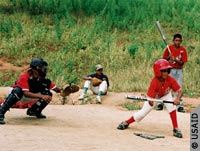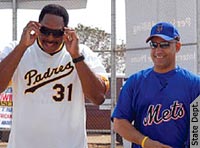SPORTS | Striving for excellence
22 December 2008
Passion for Baseball Used in Dominican Republic Development Plan
U.S.-Major League Baseball alliance could spread to Central America, Africa

Washington — The U.S. government is using the passion generated by baseball in America and the Dominican Republic to help impoverished communities in the Caribbean nation.
The Dominican Development Alliance, an agreement between the U.S. Agency for International Development (USAID) and Major League Baseball, aims to tap into that passion for baseball to help young people in the Dominican Republic “get an education and do well in life,” says USAID’s Jeffery Cohen, who is involved in planning the alliance. The program may be replicated elsewhere, he added.
The Dominican Republic is a hotbed for baseball, with the sport a way out of poverty for young Dominicans, Cohen, USAID’s program officer for that country, told America.gov.
With a population of about 8 million people, the Dominican Republic produces more than 25 percent of the professional baseball players in the United States. Cohen said a yearly average of 450 young Dominicans sign baseball contracts with the 30 major league teams in the United States and Canada. At the end of the 2008 baseball season, about 100 Dominicans were playing in the major leagues, while another 2,000 Dominicans were members of the 78 U.S. minor league teams that are affiliated with major league teams. Young Dominicans, said Cohen, play in the country’s summer leagues, organized through 30 baseball academies.
Cohen said the idea behind the alliance is to “tap into the love and passion” for the sport and tie American baseball fans, teams and players to community-development activities in the Dominican Republic. Those activities include promoting health care, youth development and economic growth through six well-established nongovernmental organizations, such as World Vision and Save the Children, that for decades have aided communities in the Dominican Republic.
HELP FROM U.S. BASEBALL FANS WANTED
USAID is providing $1 million in incentive funds over three years for the alliance. That money will serve as matching funds for any donations received to help finance community-development activities. For example, if a player donates $1,000 to the alliance, USAID will match this sum with another $1,000.
Current Dominican major league stars David Ortiz, Pedro Martinez and Robinson Canó were among the players who joined American officials at the November 19 signing ceremony for the alliance in the Dominican capital of Santo Domingo.

Cohen said the eventual target is to get every signed Dominican baseball player “to give back something to his community, and also for major league teams to help those communities where the players’ baseball development academies are located.”
Major League Baseball’s consultant in the Dominican Republic, John Seibel, said on the organization’s Web site that “we're really interested in getting groups in the (United) States, who may be fans of a particular Dominican player on their major league or minor league team, to chip in. It just doesn't have to be a financial donation. I think they could even come down here as volunteers and help. It's a fan-based type of thing, and we want to get as many people involved as possible."
Cohen stressed that while getting big-name major leaguers to participate in the alliance will help the cause, the end goal is to focus on young Dominican players. By giving back some of the money earned from signing contracts with major league clubs, they can be “heroes” in baseball and in their communities, Cohen said.
POTENTIAL EXPANSION OF ALLIANCE TO NICARAGUA, GHANA
USAID, Cohen said, seeks to build “community-to-community relationships,” with his agency serving as a facilitator for a long-lasting working alliance between the major leagues and the nonprofit groups who will carry out the community-development projects. The alliance is part of USAID’s overall strategy for public-private partnerships that match the agency’s strengths with those of the private sector to improve educational opportunities, the environment and health care in developing countries. (See “Public-Private Partnerships Maximize Development Assistance.”)
Once the alliance becomes established in the Dominican Republic, Cohen envisions similar plans expanding to Nicaragua and other hotbeds of baseball in the Americas. But even in countries where baseball is not king, such as in Ghana, Cohen sees the possibilities for a similar alliance helping to expand the sport’s popularity while serving as a catalyst to boost the local economy.
In February 2007, Major League Baseball sent a group of “baseball ambassadors” to Ghana. Included in the group were New York Mets General Manager Omar Minaya and Hall of Fame player Dave Winfield. The delegation conducted baseball clinics and presented thousands of dollars in baseball equipment to children in the African nation. Another Major League Baseball delegation visited Ghana in January 2008.
While USAID is eager to continue helping people in impoverished communities, the key to such efforts as its baseball alliance is private-sector involvement, Cohen said. Private-sector giving and investment in countries in the developing world, he said, “far outweigh” the public-sector dollars that go to these nations in the form of official development assistance.
Cohen can be contacted at jcohen@usaid.gov for more information about the USAID-baseball alliance.
A fact sheet from USAID and a fact sheet from Major League Baseball on the alliance are available on the organizations’ Web sites.
See also “Baseball Plays Key Role in State Department Public Diplomacy” and “Baseball’s Cal Ripken Jr. and Dennis Martinez Visit Nicaragua” on America.gov.
